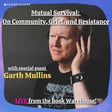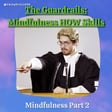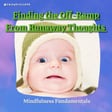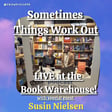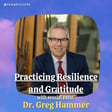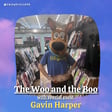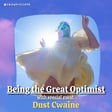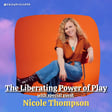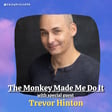Introduction: Guests and Topics
00:00:08
Speaker
Well, hey there, sweet peas. Welcome back to Friendless. I'm your host, James Avromenko, and this week I'm joined by my friend, Tessa Irwin. We discuss the communal impacts of patronizing artists, the pitfalls of independent filmmaking across the world, the legal pitfalls of lobsters on film, and so much more.
00:00:27
Speaker
Tessa is a dear friend, and I was so excited to get her on the show. But enough from me. Let's get to the interview. It's time to lean back, get comfy, set your volume at a reasonable level, and enjoy my interview with the one and only Tessa Irwin here on Friendless.
Technical Glitches and Episode Re-recording
00:00:48
Speaker
All right. This week on Friendless, I have a dear friend of mine, Tessa Irwin, who um we actually tried this once already. This is this is take two. That was rehearsal.
00:01:01
Speaker
Exactly. Exactly. Right. Exactly. This was it was it was just, you know. um Yeah. Yeah. It was it was a a test run to make sure that all our microphones work. And they did it that time. Yeah. Just why we're doing it now. I have new headphones Amazing. Amazing.
00:01:17
Speaker
I felt so friggin' bad because I loved the conversation we had, but as I was editing that first pass of it, it hit a point where was just like, there's nothing I can do here.
00:01:28
Speaker
Oh. you know I don't remember what we talked about. anyway And I'm sure we'll circle to a lot of it right now, you know, in in this conversation, because because, yeah. yeah So so I'll I won't caveat too much. i'll I'll let you answer
Tessa's Career in Canadian Film Industry
00:01:43
Speaker
the question. But for listeners who may not know you, may not be familiar with you, um who the hell are you?
00:01:49
Speaker
I'm Tessa. I'm your friend. Okay. I work it mostly in the Canadian film industry um as an assistant director for the last decade or so, which is terrifying.
00:02:02
Speaker
Yeah. ah yeah So, you know, one thing that has really what's the right word for it? Something I'm i'm continually surprised by since moving back to Vancouver is all the people who kind of key work in film.
00:02:20
Speaker
Because I just remember growing up, it was always like this unattainable other world, you know? and and and you know, my first dream was to be a film actor. That was the thing that, like, when I was a kid, ah remember, I can still remember, I remember seeing the Bela Lugosi Dracula.
00:02:37
Speaker
And, like, finding out that that was an actor, finding out that that was, like, a guy who got to put on a costume. and I was like, that's the coolest fucking thing. Like, how could you not want to do that for the rest of your life? Just, like, get paid to be Dracula?
00:02:48
Speaker
Yeah. Fuck yeah, you know? But it was always this, like, out-of-reach world. And and um now, coming back to Vancouver, it's like everybody's just, like, low-key working in film in some capacity, you know?
00:03:01
Speaker
Yeah, it's very strange in Vancouver.
Comparing Film Industry in Australia and Vancouver
00:03:04
Speaker
Like... I worked for so hard in Australia to try and like break into the film industry. And it seemed like such a struggle. And, you know, you really had to like do so many hours of volunteering and then you might meet someone who might be able to give you a job at some point.
00:03:19
Speaker
And then I came to Vancouver and so i was very lucky that when I got here, the film industry was like booming, like crazy. And my interview was pretty much someone calling me at 8pm at 9 being like, can you be here tomorrow?
00:03:32
Speaker
was like... Like, no resume. Yeah. No questions. Just, do you have a heartbeat? Can you be here at 8am? Amazing. And then, there's so many people in the film industry that have, like, degrees and qualifications in, like, other things. Like, my good friend and co-worker has a neuroscience degree.
00:03:52
Speaker
Ah. Like, people, like, just did all the, and, like... all these other things and then just kind of through some weird circumstance fell into the film industry yeah yeah so it's it's quite a odd collection of people so so does the does the film industry like behind the scenes work that pays better than neuroscience scientist scientists a neuroscience Well, i think I think they also worked out that they just didn't like working in a lab.
Financial and Time Commitments in Film
00:04:20
Speaker
Gotcha. Yeah. so But it does pay very well yeah to work in film. um The downside to that is that you work incredibly long hours yeah or often are out of work if the industry is not doing well. Yeah. um But if you get regular work, you can make excellent money. Yeah. Yeah. yeah that it's that It's the consistency piece.
00:04:40
Speaker
yeah i Yeah. You know, when I when I was living in Calgary, I that was when I finally started kind of taking one crack at it, and especially because in those years, I mean, I'm sure it's still the same, but tons of Western stuff was filming.
00:04:54
Speaker
So if you had a beard and long hair, you were. you were cast you know um but but the the spacing between projects was just um yeah untenable you know um and that was you know that was being an actor so so even though you get all the like the accolades you're also real low down the rung terms of of you know what you're being paid to do.
00:05:20
Speaker
ah Right. You know, um, how do you maintain that? Like, do you find, ah do you find you just have to kind of like buckle up and, and ride the waves or like, how you, you roll through that kind of feast famine style I mean, it has been a struggle, particularly the last years. I mean, when I got here for years, it was excellent. Like, I could just work as much as I wanted to, which was great. But then, you know, COVID and the strikes, there's been some real dry patches. Even now, it still hasn't gotten back to pre-strike levels.
00:05:54
Speaker
um I mean, like, I've been saved a lot of money, and so I have been able to long periods in between, you know, with some EI help here and there. But I mean, during the strikes, actually worked as a cleaner for a bit on TaskRabbit.
The Value of 'Unskilled' Jobs
00:06:10
Speaker
Fuck. Yeah. ah Which wasn't as bad as I would have thought. It was actually quite enjoyable. Yeah. It was like weirdly enjoyable. You know, I've always said my my favorite job that I ever had was a dishwasher.
00:06:20
Speaker
Yeah. Like if i if I could pay my rent and live comfortably as a dishwasher, fuck yeah. It's just that yeah no job pays well for that. No. I love those kind jobs. I mean, it actually paid surprisingly well really cleaning people's houses. People pay you a lot of money that they don't have to do those things. Which is pretty funny for an essentially unqualified job.
00:06:41
Speaker
Yeah. yeah But that, you know, I mean, that's funny. that That leads me in such a different digression than I thought we would go. But, like, I am a huge proponent of if anybody is going to get overpaid, it should be these quote-unquote unskilled labor tasks.
00:06:58
Speaker
yeah Those are the jobs that actually matter. yeah Those are the jobs that we need. and And without them, society falls apart. Society would be fine if we lose the CEOs. Exactly. Nothing's going to change. yeah you know But if we lose the cleaners, if we lose the dishwashers, we're fucked.
00:07:13
Speaker
yeah you know Because heaven help us if we have to do it ourselves. you know So like those are the people who should be fucking ranking in the box. you know It's funny, I was talking with my sister about this recently.
00:07:23
Speaker
um Like, shouldn't CEOs being the first ones to replace with AI? Like, isn't that essentially, aren't they like predicting markets and things like that? Isn't that what AI is for? Like, let's replace CEOs
AI's Future Impact on Business Roles
00:07:35
Speaker
with AI. Yep, yep. I saw the bleakest graphic the other day.
00:07:40
Speaker
So a couple weeks ago, I went to a tech convention thing. All these people talking about what is coming down the pipeline and stuff like that.
00:07:53
Speaker
And it led to this discussion about how... The next wave that a lot of these kind of like entrepreneurs think is coming is essentially like one person enterprises um where it's just a single founder CEO and then a ton of AI bots running different programs.
00:08:11
Speaker
And there's like an infographic of it. And it's so fucking bleak because every task is like... bot does this, never stops working, never complains.
00:08:23
Speaker
And it's just, it's so fucking gross. And it's just, it's one of those, it's one of those images of like, tell me you're a sociopath without telling me you're sociopath. Yeah. yeah um But it, yeah, I agree wholeheartedly. You know, it's so funny to me that the people who are the most like dazzled by by AI are the CEOs.
00:08:41
Speaker
Yeah. And yet they're the ones who technically should be the ones being replaced by it. Yeah. but The mother fires. Yeah. Yeah. No, replace studio heads with AI. They can predict what people want to watch.
00:08:54
Speaker
They know exactly. And just like, and just let the, and like, especially that, that idea of like the meddling ah producers and stuff like that. Right. Like let them but be the AI so that you can be like, quiet down, pal.
00:09:07
Speaker
Turn off. right Exactly. Ignore requests. I love it. ah Do you, in your role, ah do you deal pretty directly with, like, producer level? Oh, yeah. Yeah? Okay. Yeah.
00:09:22
Speaker
um I don't know, actually, it's funny. Have you seen The Studio yet? Have you watched that? video No. It's on my short list, though. There's, it's wonderful for so many reasons, but there's, like, one moment in that that made me laugh so hard where Seth Rogen comes to set and everyone's trying to because he's the studio head, everyone's trying to keep him away from the director.
00:09:41
Speaker
Right. And they set up his own monitor. So he's like a VIP monitor, basically just to keep him away from everyone. And let me tell you, I have done that so many times. really I've been told to keep this producer and this studio person away from the director.
00:09:57
Speaker
And it has never once worked. You cannot do it. Yeah. Like, like I mean, it it's it's that really, it's that awful thing that we have allowed to happen where, where you know, it comes from an idea of goodness, in in my opinion, in that, like, it's it's it's the logical principle progression of like the benefactor or like the the sponsor or you know like how like what's the word i'm i'm forgetting but how like you know da vinci had the medicis patrons thank you right you know they're essentially patrons right yeah that's true um but the thing was
00:10:32
Speaker
But patrons... I feel like the difference is patrons were doing it... Oh, yeah, okay. No, please go on. yeah That patrons were doing it because they believed in the art and they wanted to see the art produced. These guys just want to make money. That's it right there. That's literally it right there.
00:10:44
Speaker
where i mean And I mean, I'm sure the fucking Medici's were
Role of Producers in Film vs. Historical Patrons
00:10:48
Speaker
sticking their hands in where they shouldn't be. I'm sure the patrons were saying... ah Maybe you could paint a little, you know, maybe make me a little less jowly or whatever the fuck, right? you know I'm sure that was going on, yeah but at least the sort of ethos of it seems to me, ah you know, 400 years removed from it, ah like they were...
00:11:06
Speaker
paying to to support the artists and to celebrate the artists. And also, you know, it it reflected well on them because if they're patronizing successful artists, then, oh, how cool are we, right? you know but But it was pushing for the art to be produced, whereas now the producers are like, ah, this fucking dumbass director, he's just there because on my whim, and i I probably know better than him, so yes, make that giant robot spider the third act, you know, that kind of shit, right?
00:11:34
Speaker
Yeah, I mean, it's to be fair, it's not every producer. There are some wonderful, passionate people out there. Especially I find in television because so many of them are writers themselves. Right, but there are But there are the other kind as well. Is a producer, for for my own kind of like,
00:11:53
Speaker
Because i've never I've never interacted higher than like you know and a director. like A producer, producer can can essentially anyone with money become a producer? or do they yeah become like ah Yeah, so there are different types of producers and different reasons people would be listed as a producer in a project.
00:12:10
Speaker
um Some of them might be writers, some of them might be creators, some of them might just put money in. Some of them might have maybe owned the rights to the IP. There's many different reasons why you might be listed as a producer.
00:12:21
Speaker
and And would that be like why you're called? Like, what would be the difference between an executive producer and a producer? ah Executive producer, essentially more money, more power.
00:12:32
Speaker
Gotcha, okay. Yeah, there's probably more definitive reasons than that. Because you sometimes see people credited as executive producers who clearly had nothing to do with the movie whatsoever. They just, like, you know... i Yeah, they probably own the studio that produced the movie or something like that, yeah. Gotcha, gotcha. yeah um ah and And so in in the sort of current ethos, like...
00:12:57
Speaker
what i put it What do they do? Other than be like, why am I giving you money? I mean, it's like I said, there's so many different ways to be a producer. Some of them, like, you will have a, like, good example is TB will have a showrunner.
00:13:13
Speaker
um Which basically, because every episode is directed by a different director, the showrunner kind of keeps the cohesiveness of the story and the style throughout the series. So that they they tend to be pretty hands-on um and are constantly reviewing um aspects going to the show, such as props and costumes and ideas. And they'll approve all the different storylines by different writers and things like that.
00:13:40
Speaker
But then there might just be someone who's like just keeping the show on budget. So that generally different producers will have a different role. Oh, so there's, of course, yeah, there's going to be multiple producers on these projects too, right? Oh, there's so many. Gotcha. Yeah. Okay. It's like a list of like 10 normally. So it's just like a whole nother tier of like you break through the ceiling and then suddenly you're in another level of bureaucracy kind of like, okay, okay, okay. Yeah. Gotcha.
00:14:04
Speaker
damn. It just never
Challenges of International Film Production
00:14:06
Speaker
ends, does it? No, no. So every boss probably has another boss as well. Fuck hell. Is there ever an end? Like, does is there anyone is there ever anyone who's not answering to someone?
00:14:16
Speaker
Oh, I mean, yeah, I guess the people who are in the studios. Right, okay. Yeah, you know, those CEOs and stuff. Yeah, okay, okay, yeah. I mean, you don't tend to really hear from them anyway. Right, yeah. Not at my level anyway. I guess they're technically they're technically still answering to, like, shareholders and stuff too, though, right? like it Yeah, yeah, I guess so, yeah, right.
00:14:37
Speaker
and Never ends, does it? Jesus fucking Christ. like what got you into film initially? like You said you were working in in Australia on it. And and so like what what attracted you to working there?
00:14:52
Speaker
Kind of just the same as you. I just always loved movies and loved TV shows. You know, was such a TV addict and movie addict from when I was a little kid. um And i I don't think I really considered it as a career until maybe later in high school.
00:15:10
Speaker
Mm-hmm. And, you know, it was I think I was a millennial who was told they could do anything they wanted to do, even if I didn't know anyone he was actually doing that. And so I just decided to get overly ambitious and...
00:15:23
Speaker
um studied film at university and then spent a number of years volunteering on things not making any money and working as a receptionist but um eventually I did get a job at a community TV station in Melbourne, C31 and that was really fun and stuff but it was sort of still another side of the industry which was I was working with um independent producers who were creating their own content and sort of giving them advice on that and you know, I got to choose the schedule for the TV station. Gotcha. You know, TV shows, what time slots they got and stuff.
00:15:57
Speaker
that was... Fuck yeah. Kind of fun, but you know, there's always... like so I say I got to choose it. There was many things that I had to sort of take into account. and The car shows got the best time slots.
00:16:08
Speaker
I would not have chosen that. But they were our money makers, so they got the best time slots. Yeah. yeah yeah So, yeah. Is there, like, you know, I recognize that Canada is is similar in the sense that, like, we're all kind of feeder, but like,
00:16:26
Speaker
ah feeder trails to Hollywood, right? That's sort of the kind of end goal. But like is there is there any way in these other countries to like forge a different path? like Or is it really the only way to truly genuinely cement making it is like succeeding in LA?
00:16:45
Speaker
I would say... I mean, there has been some very good Australian movies produced over the years that I'd say sort of broke through. was Australia an Australian movie?
00:16:59
Speaker
With Hugh Jackman and Kidman? mean, I think it was funded from the US. yeah I mean, I think it was shot in Australia with an Australian crew, but the US s money was coming. okay yeah I'm pretty sure. I haven't looked into the finances, but I will take a hazard guess.
00:17:15
Speaker
but There was some American dollars behind that. um That's funny. I haven't thought about that for so many years. Yeah. yeah So like the I mean, the main one that's coming to mind at the moment is Talk to Me.
00:17:29
Speaker
Sure. Yeah. Which was such a hit. And I just saw a um Bring Her Back, which was also excellent. right Yeah. and That one is not I'm not going be able to do that in theaters. I already know.
00:17:43
Speaker
Yeah, we'll talk about that later. It's a great movie. um So I think a lot of these big Australian directors, even once they make it big, then you can just get so much more funding through going through the US studio systems. Whereas a lot of the films made in Australia are sort of privately funded.
00:18:03
Speaker
And there is some government funding um as well, but it's much smaller budgets generally that you're dealing with. So to make a big budget, maybe you tend to have go to the US. Right. Yeah, okay.
00:18:14
Speaker
And I feel like that's kind of the same. Like, like if you're not Paul Gross in Canada... I mean, maybe UK and stuff would probably be a better example of having a more stronger film industry. That's
Film Industry Comparison: UK, Canada, Australia
00:18:25
Speaker
what I was curious about. That was the next one, because i was I was sort of... I feel like, you know, Canada Australia in so many ways are kind of similar cultural levels you know and then yeah the uk but you still see so many uk actors kind of like honing their craft over there and then still coming here to like get paid yeah i think the money is in the us right yeah okay like they can make excellent movies in so many countries but the
00:18:53
Speaker
the paycheck is here yeah you're getting more money from the u.s because they're bringing in more money they've got just got that you know such a wider reach right yeah the uh yeah i love the pipeline of all the blonde british actors who moved to the states and immediately they're now all uh dark-haired you know the like tom hiddleston um i i um I seem to remember Benedict Cumberbatch being lighter haired in the UK.
00:19:19
Speaker
um There's a few examples of it. Why is this? I have no idea. That's what I'm curious about. I don't know. never thought about this. yeah they all they all you know Their agent is like, nobody likes a blonde Brit. You too blonde.
00:19:34
Speaker
That's probably true. Actually, when I think about it, are there any blonde British people that are likable? The only blondes I can think of who are British are the royal family and, like, fuck them, you know? so Yeah, I'm trying to think now.
00:19:50
Speaker
Yeah, I can't think of any blonde. Right. british i keep thinking clake blanchett and then i'm like oh no she's australian yeah she's not yeah yeah she just seems british yeah british vibe she carries herself britishly you know yeah yeah um and you know the back end of film is so fascinating to me and and the idea something that i we've talked about many times just you know offhandedly hanging out um but i find myself so intimidated by is is um
00:20:24
Speaker
You know, the idea of creating films is so alluring and it's so magical. And yet the, you know, as you're saying, the resource commitment needed to make something even passably worthwhile yeah's just so out of reach, you know. and And I'm curious in your experience, like how have you been seeing, like how do people adapt to that?
00:20:50
Speaker
you know because because i i often hear about people are like well i had no money so i had to write a two-hander film that took place in a living room because that's all i had you know but like but then we've got like horror movies that are like no fuck that we're gonna make it about demons and it's gonna be all kinds of crazy shit and you know and so it's like how do people how do you adapt to those kinds of resource needs Do you mean going from low budget to high budget films? so No, like keeping it low budget. keeping it? How the fuck do you do it?
00:21:20
Speaker
I mean, maybe this is way too broad of a question, but it is it is one of those things that's like always stopped me from ever trying because I've just been like, i don't even know where you would fucking start. It is tough. I think... The easiest way to make a low budget film is to have good friends and networks who will volunteer their time and possibly the equipment they own and things like that. Hopefully in the and the idea that you'll do the same for them.
00:21:47
Speaker
right So it's kind of like a co-op. situation. And you know, I've volunteered on Friends Films and I'm still willing to volunteer on a Friends Film if I think it's a worthwhile project. um That being said, it's also hard to find the time to do that when you're already actually working um because the weeks are so long. but that's just it like How do you even pull something like that off in in a place like Vancouver where it's like no, man, I got to pay rent, you know?
00:22:13
Speaker
Yeah, I mean, but I guess with film, you generally do tend to take time off in between gigs just because you would die you didn't. Like, if you worked full year straight, like, you would burn out so fast.
00:22:27
Speaker
So I guess people do take time off in between. You might take a couple of months off, so, you know. Might as well fill with a couple. Yeah, you might do a short film then. And generally, you'd film something like that, hopefully, in a couple of days. Right.
00:22:39
Speaker
You might try and do it, yeah. How have you been seeing... So I just saw this video today from an account that I really like on um on TikTok. He was talking about how he used to have these dreams of being ah filmmaker. And he's since kind of shifted to being more focused on he wants to be a YouTuber. Because he's seen the sort of entry barriers into the film world being so difficult to navigate and and kind of you know get through that...
00:23:09
Speaker
YouTube has created this whole new ecosystem that you can get into easier. yeah have Have you seen that kind of like outflow of new new creatives or is it just creating a different type of creator? Like, how are you seeing that?
00:23:24
Speaker
I mean, for sure, it's so... like I think everyone starts out wanting to be ah director. Of course, yeah. We just all want to be directors. Who wouldn't want to be fucking Steven Spielberg?
00:23:34
Speaker
I know, just want to tell every single person what to do. Literally, right? Have whole army at your disposal of people. um But there is so many barriers, and especially because you know you can create these wonderful low-budget films, but like if you're making a film without money, your writing has to be... like out of this world.
00:23:56
Speaker
You know, like, really, you either need money or you need, like, the most incredible writing anyone's ever seen yeah to really make an impact in these competitive, like, short film competitions and things. so Anything that will lead you to a really good career.
00:24:11
Speaker
um And even, there's a lot of barriers if
00:24:17
Speaker
I mean, they are, like I say, barriers in that these can all be overcome if you work hard enough to dedicate yourself enough. But it's a lot of hard work. Yeah. yeah And I've sort of even moved like i sort of moved away from being a director. I won't say that I'll never direct anything ever again. Sure.
00:24:34
Speaker
But I have just seen so many people work for so many years and struggle and struggle and struggle and just constant step backs. Yeah. Yeah. So, well, it is that funny thing, too, isn't it? Of like, it's it's it's one of those.
00:24:49
Speaker
There's so many trap doors. Yeah. In that it feels like an industry where you think, oh, if I start as a, you know, a PA, I can work my way up and I can build connections and people know me and then I can grow into up and up and up and up.
00:25:03
Speaker
But more often than not, it's just the shithead who shows up and is like, no, I'm a director. Go fuck yourself. I've never done that. I've never will do that. You know, like it's like, yeah, sometimes it's the people who sort of like have the audacity and the arrogance to jump the line. Yeah, know they do.
00:25:19
Speaker
That tends to be easier for you from the US s as well. Yeah, yeah right, exactly. it there There is more barriers if you're, you know, a Canadian or from somewhere else. Totally.
00:25:29
Speaker
Working in within the US s film industry than if you're actually Yeah, I guess you can't just show up and say, hey, yeah you're working for me now. Because they're like, union. Yeah. Are you in the union? And you're like, uh, no, I'm not in the union. Yeah. So...
00:25:43
Speaker
How are you seeing this sort of like with that kind of like international collaborative market or like the just the international market in general? Like how how is it is it growing or is it shrinking? Like is there is there more opportunity now to get like international visibility from a locally created project? Or is it still like if it's not made in the U.S., it's not being seen anywhere but its home country?
00:26:09
Speaker
You know, I'm not sure if I really know that much about that, to be honest. Yeah, yeah, yeah. I know like a lot of the streamers and stuff have agreements with countries, different countries that they have to show so much Canadian content or Australian content and stuff like that.
00:26:27
Speaker
And, like, I guess there are a number of Australian shows that I've seen living in Canada that have sort of made it over here and are on Netflix and things like that here. So, maybe.
00:26:38
Speaker
But I don't know how that compares to, like, pre-streamers. Sure, sure. Yeah. I guess it was just, yeah. I've also felt that, like... Netflix has become the new format for like direct-to-direct video, like what would have been direct video. yeah And so it's like so many movies that it's like, oh, this was a great elevator pitch.
00:26:56
Speaker
And they didn't think beyond that. you know
00:27:01
Speaker
Yeah, it's true. but um So you said so so you said you you you've still got, or you you've had inspiration aspirations to direct yeah and may still have. yeah Is that sort of like the that the kind of like, I don't know if I would call it the end goal, but is that sort of like the aspirational field goal you're going for?
00:27:26
Speaker
To be fair, haven't put in much effort the last few years. That's so fair. I don't think it is anymore, to be honest. I think it's something that if I did it, I'd do it because it was something I enjoyed and I wanted to do.
00:27:42
Speaker
i don't think I have the drive to be a big Hollywood movie director anymore. Sure.
00:27:50
Speaker
As fun as that would be, I think as I've gotten an older, I've got kind of more realistic about the life that that would actually – what that would actually look like, and it's become less less appealing.
Evolving Aspirations in Film Industry
00:28:02
Speaker
yeah That's something I've been thinking about a ton lately, actually, because I listen to a lot of, like, movie podcasts, and I listen to a lot of the – you know, and and something that keeps on popping up in my mind is this idea of, like – All the stories that ignited my imagination as a kid you know and but and as I grew up and all the all the people who I thought, like wouldn't that be a cool life to have? Steven these things.
00:28:25
Speaker
That's never going to happen again.
00:28:30
Speaker
It kind of can't. Yeah, it's probably true. Like, the way that that sort of class of directors came up and and the way they work together and the way they just kind of bamboozled studios for money and made their shit. And, you know, like, it just kind of can't happen anymore.
00:28:46
Speaker
Yeah. and And so it's, like, it's like not worth... beating yourself up yeah for not being able to replicate that you know yeah right yeah i think i just i think when i was younger i thought i was going to make a couple of short films that made everyone realize i was a genius and then they would just give me millions of dollars yeah to make my feature yeah i think that's how i thought it worked yeah Which I guess occasionally that still happens. It's just that but instead of making your big feature, instead they're like, here, make a Marvel movie. Yeah, yeah.
00:29:19
Speaker
They're like, make the Lion, the Witch, and the Wardrobe again. Yeah, yeah. Literally, literally. But then if it bombs, yeah you'll never work in this town again. Yeah, exactly.
00:29:30
Speaker
It's such a bizarre tightrope walk that they make new directors walk. And that kind of like trial by fire kind of thing. yeah you know and yeah it's yeah i guess i guess it's a way to see if they can hang with the old boys club kind of thing.
00:29:48
Speaker
It's fucked up. we We were talking before, this is this is a funny transition, but but but it it really links into stuff in a sense of like the the the formation of Hollywood is such a,
00:30:04
Speaker
funny little sidebar fascination for me, you know? And just, like like, how Hollywood itself, like, how it developed is a whole thing we can can't even scratch. Yeah. But, like, we were talking in our in our first try at the at the podcast, we were talking about the the history of the Oscars and what what yeah kind of caused it to come out. and Yeah.
00:30:25
Speaker
It's ah surprisingly really related to stuff that's going on recently. Stuff about the strikes and stuff about all these kinds of things. and and yeah Can you remind me again yeah what like like what was the impetus for i think creating the Oscars?
00:30:42
Speaker
We're talking about i think um sort of who what departments receive Oscars and what don't.
Origins and Intentions of the Oscars
00:30:48
Speaker
and so so The Oscars was actually kind of created as like a union-busting process.
00:30:53
Speaker
tactic. It's actually a really funny story. I had to look this up to remind myself of it, but Louis B. Meyer, who was one of the M's in MGM, so like a really big deal. Famously a piece of shit. Yeah.
00:31:07
Speaker
Yeah. So he was, it's such a ridiculous story. He was um building a beach house. And he wanted to use um industry labor, like film industry labor, because they could do it much quicker than actual, you know, architects and house builders. And cheaper for him in that way. Yeah.
00:31:25
Speaker
And um someone reminded him that they'd recently unionized so that they it was going to cost him a lot more money than otherwise would have to build this beach house. let shoot I love that it's not related to filming a movie. It's just to build his beach house.
00:31:40
Speaker
and this kind of, I guess, spurred in his mind that he had to stop everyone else in the industry from unionising, because at that point actors and directors and things, a lot of departments hadn't unionised yet.
00:31:53
Speaker
and So he created the Academy of Motion Picture Arts and Sciences. I think he just threw in the science to make it sound more spiffy. And the idea was that this would sort of...
00:32:05
Speaker
He would tell everyone that this academy would look after them and deal with disputes and things like this. But actually, it was just made up of studio heads and producers and things like this. And...
00:32:18
Speaker
the Oscars kind of came out of this as, you know, this academy that formed. And basically, one of the ideas sort of behind it was that people would view themselves as like independent artists rather than labourers.
00:32:32
Speaker
they wouldn't kind of get the idea of joining a union because that's a labour
Actors' Unions and Historical Labor Dynamics
00:32:37
Speaker
thing to do. So, yeah. And he's he's actually quoted as saying, think the quote is, um give them awards and cups and they'll kill themselves to make what I want to produce. Wow.
00:32:48
Speaker
It's so fascinating because that that that sparks a ah thought to me. that that So that's something that they still do today in pro wrestling. like Like in in the WWE, all their wrestlers are hired is as independent contractors.
00:33:01
Speaker
So they're not actually employees of the company. They're independent contractors. um And yet they're also not allowed to take any contracts with any other company. They're to do anything else that's not approved by the WWE. Yeah.
00:33:13
Speaker
So it's like independent in name only. Well, it's even worse when you think about back when the Oscars were created, they were still under the studio contracts. So as an actor, you were employed by the studio. Right. And they told you what movies you had to do when you couldn't work for anyone else. Yeah. yeah Wow. Yeah.
00:33:32
Speaker
ah This is you know deep in the recesses of my brain from from binging You Must Remember This years ago. ah But there was there was some connection to the formation of United Artists with this stuff.
00:33:45
Speaker
um Because United Artists was like a bunch of actors getting together and becoming producers. I just remember Boris Karloff was a part of it. Okay. But do you remember any of that? am i Am I totally? No? Okay. Okay. So what I thought sort of happened was that during the depression, they kind of did some dodgy contracts where they um decided to pay everyone who wasn't unionized, like 50% less.
00:34:11
Speaker
Jesus. And the academy kind of agreed to that. I thought that sort of led to the forming of actor unions and things. Gotcha. Okay. But I could be less clear on those details. I defer to you way more than to me.
00:34:21
Speaker
No one quote me on this. Can you explain to me why movies are so expensive? I mean... Like, what is it? Because you look at some of these movies and you're like, how is that a billion dollars?
Cost Breakdown of Big-Budget Films
00:34:35
Speaker
Like, how is this Marvel movie a billion dollars? Well, yeah, apparently the new Marvel movie yeah is going to be the first of a billion dollar movie. how? That's crazy. I mean, i I'm no expert, but there's a lot of people sure um working incredibly long hours. so you're paying a lot of unionized people working incredibly long hours. So you're paying them lots of money. Like I said, you can make very good money working in the film industry. Yeah, fair.
00:35:00
Speaker
And, you know, when it's something like Marvel, like those actors are getting paid. Right. Yeah. ginormous contracts. I mean, Robert Downey Jr., he's probably clearing $100 million himself. Yeah, exactly. So I'd say a lot of that, plus the all the producers would be getting ginormous paychecks. yeah So I'd say a lot of the money would just be purely paying people.
00:35:21
Speaker
And then when it's something like a Marvel movie, like all the special effects and right huge locations, so many extras. Right. And I mean, there is a lot of very specialized equipment as well in movies. You know, things that are designed specifically for. Because it's not like you own the camera or those kinds of things. Well, often a camera ah camera operator will own their camera. Really? And then they'll lease it to the to the production and things like that. Yeah, a lot of people own their own equipment because that's another income then for them.
00:35:50
Speaker
Right. When load out your equipment. Yeah. that's so interesting. i i Because I would have always thought like the studio would own the cameras, you know. No, a lot of the time all the equipment is leased. Wow. So that's another big cost.
00:36:02
Speaker
Interesting. yeah I mean, it might be different in the US, but that's yeah definitely the way a lot of the time it works here is you rent all the equipment. From the operators. um or Or from rental ah gotcha tech companies. yeah yeah But a lot of people have come with their kit and then have a cute rental fee. Is there ever the case of like, you know, you you you you've hired some guy and he's like, yeah, I got a camera and he shows up, he's just got the wrong camera and you're like, oh, we're fucked, you know? Oh, no, no, no. I'm not saying all camera operators do this either, but also, ah particularly if like the director wants to shoot on a particular type of camera, but often they'll be like, oh, this is my camera, but maybe they'll rent other lenses to go with it for that movie and things like that. yeah um
00:36:43
Speaker
I'm going to i'm gonna do a little bit of ah a funny pivot, and I'm going to try and relate some of this to to the exploration
Film Industry's Sense of Community
00:36:49
Speaker
of the show. Yeah. Because something, ah you know, <unk>re we're dancing around this idea of like, we're dancing around community and we're dancing around this idea of connections and these kinds of things. And I'm curious in your experience, like, what sort of community is fostered out of this type of career?
00:37:10
Speaker
It's a really strong one. Yeah. To be fair. Yeah. The film industry community is so strong because you're jumping from project to project and you're meeting new people in every single project. And then you're jumping onto the next one and seeing those people that you saw three projects ago. So everyone kind of knows everyone, even though industry is huge. Yeah.
00:37:30
Speaker
Yeah, so it is it is very cool that way. That's so cool. Yeah, it's sort of this interwoven group of people. okay that's really reassuring to hear because, you know, i I, like, when I was in the, it was a similar thing in the theater world. But what I found in theater was that because there's no money anywhere, everybody knows each other, but everybody contemplates. kind of low-key hates each other because because there's just always this slight tension.
00:37:58
Speaker
yeah like there's And I don't think even most people would even acknowledge it or even realize it, but there's just always this like underlying vibration of tension because it's like, oh, I'm so happy for you that you get to do that play. It's the one play that pays well this year. you know yeah like um Whereas i guess in film, because there is the opportunity for more money, maybe there's less of
Team Dynamics in Film Production
00:38:21
Speaker
I would say there's still probably an element of it, but sure probably a bit less. Yeah, yeah. and And is there much crossover in terms of sort of like... Because you hear stories about like directors who will who will basically just work with same people over and over, know? Yeah, I mean, a lot of people tend to have their team, but then like...
00:38:40
Speaker
So, you know, I work in the AD department and work with a lot of the same people sometimes. But then the grip team will be different on that project to, like, the makeup team. and Right. So it's sort of the departments that switch out, depending on which project you're going to. Gotcha. So is that sort of, like... ah Forgive me if I'm grilling you on this. subject I just I find it so fascinating and I don't know anything about it, you know, so like so is that like, you know, you're hiring sort of like I'm thinking of it from the viewer perspective of like, you know, you take the Oscars, for an example, you know,
00:39:13
Speaker
Somebody gets nominated for Best Makeup, right? Yeah. it's like some person who clearly wasn't the only person doing the fucking makeup on the movie. Yeah. But they're the one who's accepting sort of in that'd be the... name Yeah, head makeup artist. Yeah. Yeah. so So when you're building out your team, it's like you hired them.
00:39:29
Speaker
And then they... build out their team below or generally yeah okay yeah okay yeah yeah interesting and often approve looks and things like that right right um i just yeah yeah i've got oh my god i'm sure you've got a billion um funny on set stories it just for some reason the one that sparked to mind for me when you said about approved looks and stuff was remember one time i was i i i got a little bit part on um What was it called? hold Hold the Dark?
00:39:57
Speaker
yeah The guy who did Green Room? Yeah, think I've heard of this movie. It's whole list. I've heard good things. It's terrible. Oh, really? it's it was It was his first miss. Oh, okay. Although that his latest one, the... Oh, my God. I'm totally blanking on what it was it was. It was Netflix released.
00:40:15
Speaker
was fucking awesome. was about a guy trying to get his cousin out of prison. was fucking awesome. So good. i wish I don't want to, like... break the momentum and start googling but uh it ruled okay um but this other one big whiff uh but i got this tiny little part as like a for the forensics photographer um and they went through you know different stages the whole time i had this killer mustache and i'm pretty sure that's why i got hired because i had this fucking awesome mustache that like just stood out i get on set and they've been filming all day i get on set at 3 a.m because it's nighttime shooting shit you know
00:40:54
Speaker
yeah The first thing they do is they're like, oh, the director wants you to shave. Oh. it's ah So it's just like, who where did this fall apart? Like, where did this communication fall apart? Yeah, interesting because I would have thought the director would have approved your casting and then...
00:41:11
Speaker
Yeah. I've seen it happen, though, to be fair. This is where I showed up was like, really? Okay. So this poor set assistant had to shave me and then had extra razor shave me to make sure was even you know? And delayed shooting because they were like, no, get that mustache out of here, you know? Yeah, it does happen. Yeah, I just like, where did those breakdowns occur?
00:41:42
Speaker
I think sometimes the director just thinks in their head we'll have him clean shaven on the day and there's a million things happening and that doesn't get past or they don't even say it out loud because they're thinking about a million things and it never gets down the chain.
00:41:58
Speaker
So it it does happen. I feel like that would be the piece that I would would make me fall apart as a director is like having to clock it. Yeah. And then having to communicate it.
00:42:09
Speaker
Yeah. you know, and having to be like, no, this is what I'm actually thinking. i yeah I would there would be so many breakdowns of the set of like, why can't you just read my mind? you know yeah And I've worked with directors when that's happened. yeah right And you're just kind of standing there staring at them being like, I can't make this decision for you. And it wouldn't be a malicious thing. It would just be like, ah i don't I don't have the words. Someone help me. you know yeah They're like, that's not right. You're like, oh, what but would you like instead? And they're just like, can't.
00:42:41
Speaker
I remember yeah yeah really you know i remember ah ah when i when I would direct, when I was directing plays, like, especially in university and stuff, and actors would have these questions, and I would have to just be like, I don't know.
00:42:54
Speaker
We'll talk about it tomorrow, because I gotta think about this, you But it's like, it's so high pressure. Yeah, but when you're at a film set, and everyone's standing
Role of Assistant Directors
00:43:02
Speaker
around waiting. That's just it, right? It's one thing to be like, yeah, I'm doing a fucking student play. There's no budget involved. Nobody's, you know, right? no No one's career is on the line here, right? you know yeah But, yeah.
00:43:13
Speaker
But, yeah. ah Yeah, it feels really intimidating. It feels really scary. um um So do you have any do you do you have any kind of projects coming up? I guess maybe you can't really talk too much about that kind thing.
00:43:27
Speaker
Yeah, I mean, i have a movie coming up and I'll be honest, I haven't read the script yet. I try not to read the script until too soon, until closer to the project because... it changes so so often. So I'm like, it's easier just for me to get there.
00:43:42
Speaker
You know, a few days before I sit down with the script and go through it. um I'm just trailer third on that one, so I'm just working with the process and the acts and the trailers, so I don't need to be too into the nuance of the script.
00:43:55
Speaker
If I was seconding, I'd do a lot more prep. so So I was going to say, walk me through a little bit. I realize we're 40 minutes in, and and and and and I'd love to circle back to, like, walk me through a little bit of what, like,
00:44:07
Speaker
your usual responsibilities are sort of at the tier you're you're working. Yeah. So I've been working as both a second and third AD. When I'm a second, I'm sort of the main.
00:44:20
Speaker
um So the first AD basically does the schedule, runs the set, basically makes sure all the things get done. um And as the second, I'm sort of their main support person. So I'm doing things like making sure people are aware when all these meetings are happening where what the schedule is where what they're going to need each day so when we're shooting i'll be doing the call sheet making sure everyone's aware of every single requirement for each scene and what time elements are needed and things like that are you on set or are you more like kind of off the side kind of thing
00:44:55
Speaker
um So I will be on set talking to people yeah about the next day and things like that or stepping in if the first aid needs a hand with anything. um But then I'll kind of sneak away to do paperwork and got type up schedules. So it's kind of a nice job that you get kind of get to come and go a bit. yeah so you're involved, but then you're like...
00:45:13
Speaker
This is exhausting. I'm going step out for a second. Yeah. I'm trying to sort of envision, you know, because, like, my experiences on set were, like, there were often, you know, 80-level people, but they were, like, literally, like, just outside the shot, you know, for some of the movies because, you know, they were helping, like, wrangle talent and stuff like that. Yeah, the third or the trainee will be on set. Mm-hmm.
00:45:38
Speaker
With the director, you know, directing background extras, queuing actors if, you know, they need ah an offset queue to walk into the middle of a scene or something like that. There also will maybe be next to the DOP, communicating between the DOP and the director and the first AD. Gotcha. Yeah. Because, yeah, they never really, like, introduce their they're levels to you. They just, you know, that you just meet a guy and he's like, hey, I'm, you know, right? But, you know, because, yeah, on The Revenant, there was, like, a whole wave of them in different stages. Yeah. And they had to cure all these different things. And it was...
00:46:14
Speaker
was all because of the horses. The horses just, like, would not behave. It was really funny. but Yeah, the next show I'm going on to is going to have a lot of horses. Really? going to be interesting. yeah there They're a nightmare. They're so, like, I mean, as as just, like, I was just Joe Schmo. I was French trapper number yeah three, you know. i was having a fucking blast.
00:46:31
Speaker
yeah but But the director was losing his fucking mind. Yeah, they often just like decide to make a loud noise in the middle of an actor's line things like that. They did this really funny thing. ah they they we did one take, and it was one of those, like you know, You know, the whole movie was these long one shots, you know, and we did one take and then the horses figured out, oh, when this happens, I get to run.
00:46:59
Speaker
oh fucking love running. Yeah. Literally built to run. So they would jump their cue all the time because they'd be like, oh, I can't wait. I get to run now. Right. You know, so they kept on blowing the shot. you know, ah so like, you know and and it's so because they had it. They had like three teams of horses rotating because one would blow the shot.
00:47:20
Speaker
One had to be on deck ready to go. And then there was a third beam like wheeled back from the end of the yeah course kind of thing, you know? and And they just kept on fucking it up. It was so funny. It took all afternoon to get one shot because the horses kept on being like, nah.
00:47:37
Speaker
Yeah, no, you things about animals. I once worked with this dog that was puppy, basically, you know, and they just could not get it. Like, it just had to, like, run around. Like, it wasn't even something hard had to do. It was just, like, run up to this actor and then kind of sniff and then go away.
00:47:54
Speaker
This dog was doing everything, but at one point it, like, ran off and they came back with, like, a sandwich in its mouth. Ha ha ha ha ha! like stolen one of the crew member sandwiches like that's gold you're giving me gold you know like are we rolling yeah i mean it was a post-apocalyptic story so it didn't make much sense okay a sandwich suddenly yeah yeah i guess that creates some continuity issues you know but still yeah it's pretty funny though outtakes you know but yeah yeah That's when you scrap the script script.
Working with Animals: Challenges and Ethics
00:48:26
Speaker
You know, this is what we're filming now. you know, it's very cute dog.
00:48:30
Speaker
It did get better as it got older. Yeah. Animal film animals are always such a funny. Tricky thing for me, because it's like I mean, and I recognize obviously they're they're they're much better now.
00:48:44
Speaker
But but like just the idea of like. essentially the dancing monkey, you know? Yeah. Like, the the sort of, like, just being bred to just be these, you know? And it's, i don't know. It always makes me feel a little weird.
00:48:56
Speaker
don't know. I think some of them love it. Yeah? To be honest, yeah. They always, in fact, they have a real issue. I don't know if you've, it's kind of but one of those funny facts from movies. They have a real issue with the dogs.
00:49:08
Speaker
wagging their tails yeah a lot of the time in movies because they're so happy to be on set. They have to like CGI their tails out yeah because they're just like so happy to be doing a good job. know Yeah. Yeah. So I think generally fair they like it. Especially, you know, dogs are kind of, they're so bred to...
00:49:24
Speaker
I was going to say, but dogs are, I mean, bless them. I love every dog. If you're getting into like non-domesticated animals, it might be more of an issue. But they're so strict on animal welfare. We have to have an AHA representative on set and things like No more of that like Werner Herzog fucking standard on rats and shit and all that stuff.
00:49:45
Speaker
But I used to have to laugh about dogs. It's sort of like they're so dumb. That they kind of don't know any better than to be happy, you know? Like, bless them. That's not me trying to, you know, subtweet dogs. But it's sort of like, how could they know to not be happy?
00:50:00
Speaker
You know? Right? You know? like No, I actually heard a story from a director recently they saying they wanted to have a scene with a in a restaurant with a lobster in the tank. And they were told they would have to...
00:50:13
Speaker
go out and catch a live lobster from the ocean and then return it to the ocean to be able to do this. And they're like, we can't just go to TNT and buy one from the supermarket. There's literally dozens. No, you can't. If it's in a movie, they they had to go get one.
00:50:32
Speaker
it was It was like the most twisted logic. Yeah. is that it And they just didn't do the same. Yeah, I imagine that probably cuts possibilities out. wait yeah Yeah. But like, does that, so so like, what is the thinking behind that? what's What's the, because that feels like that's way more traumatic for that lobster. I think it can't be like that you're killing a creature for a film, even though...
00:50:54
Speaker
But you're just filming it. You're not killing it. And in fact, you're saving that poor lobster from being... I guess, what are you doing with it afterwards, though? You're not going to go put a ah a lobster from a supermarket back in the ocean, I guess. Right. don't could you? I don't know enough about lobsters do this.
00:51:08
Speaker
I feel like maybe you could. don't fuck lobsters. But, you know, that's just my own seafood biases. But there was just some really weird logic behind this, that you can buy a lobster and eat it, but you can't buy a lobster and put it in a movie.
00:51:23
Speaker
Yeah. crazy Yeah. um Yeah. I mean, that obviously... Yeah. i might but This is not ah kind thought of of mine, but i just I'm also like, yeah, sea creatures are monsters. So, like, you know. I like lobsters.
00:51:40
Speaker
They live such a long time. Do they really? They live like 100 years or something. Aren't they, aren't they like, ah technically an arachnid or something? Like, there's something weird about, like... maybe Yeah. They're... i don't know. They freak me out.
00:51:50
Speaker
They're... bear Don't they make for life as well? Do they really? Did I make that up? That's cute. um Something about me feels like they are monogamous animal.
00:52:01
Speaker
There's something about like, I can't of but feel like they give up the aesthetic of like, I gotta settle for something. Look at me. You know? like They're like, fingers can't be choosers here. Look at these fucking antennae. know. They're like red.
00:52:15
Speaker
They've got some style. Yeah. yeah there're They're not supposed to go white, right? like That's a bad sign. Oh, probably. Yeah. Maybe like deep sea lobster or something. Right, right.
00:52:27
Speaker
Just fucking up. Lobsters, shrimp, just crustaceans in general. and boom I don't know. I'm not, you know. that That's been one of the easiest pieces of... I haven't really talked to us about this on the show, but ah but i I have been gradually working my way towards a vegan diet.
00:52:45
Speaker
I've been very drastically cutting meat. I'm trying to cut meat, too. It's not as hard as you think it's going to be once you kind of get going. um I'm still not fully yeah there. My first stage is going vegetarian and then eventually to vegan. But I just... may Cheese is really hard to give up.
00:53:03
Speaker
Because the one thing that isn't as good in the vegan... Like, vegan equivalent stuff, for the most part, actually fucking slaps. How's vegan yogurt? I love yogurt. This is the thing. The vegan dairy stuff is pretty hit and miss. Especially, like, the vegan cheeses.
00:53:18
Speaker
yeah um But I will say, actually, vegan ice cream... Yes. Actually rules. Coconut ice cream. Yeah. So I almost would imagine that that some of those other creams might be might be decent.
00:53:33
Speaker
But I don't know. I can't speak confidently about it. but made banana skin bacon today. Oh. was really good. I'll bet. It was just such a weird thing that I wanted to try it. And then i was like, oh, this is actually really It's kind of leathery. I mean, yeah I've had those plantain chips and stuff, right? Yeah, you know so it's kind of like that. Similar vibes.
00:53:54
Speaker
Cool. it was good. Do you know to remember when like liking bacon was ah whole personality in the mid-2000s? Yeah.
00:54:05
Speaker
That one i never understood. I was always like, cool. I was mostly vegetarian for quite a number of years. yeah. And actually bacon kind of got to a point where it was pretty, like, the thought of was kind of disgusting. It's grotesque. Yeah. i Bacon's the easiest, for me it's the easiest meat to miss out on.
00:54:22
Speaker
Yeah, I don't know. It does taste good. it can you know but i think about it too much i'm like it's disgusting it's vile yeah yeah it um i also you know pigs are my like one of my top three favorite animals very cute so and they're so smart yes and they're so friendly yeah and they're just like like you think you like a dog meet a pig yeah pigs fucking cool compared to dogs you know um Plus, there's like a hundred more pounds of them to go around. Yeah, that's true.
00:54:53
Speaker
They're the best. you know so So, yeah, dropping pork is the easy one for me. But but that being said, cows are the same. They're fucking adorable and amazing and have little best friends.
00:55:05
Speaker
And yet I'm really struggling to drop cheeseburgers. So, you know, I'm nothing think if not hypocrite. can give beef pretty easily. Yeah. yeah chicken Chicken's a hard one for me. Yeah. Yeah.
00:55:16
Speaker
jesus I have a story for each one. Chickens, I'm always like... I'm always like... Because I've raised chickens working in Barkerville and stuff. And so like I have a bit of a blood feud with chickens. Yeah, they're kind of bitches.
00:55:29
Speaker
They're assholes. Oh my god. They're assholes. And so I always, you know, and they have those evil eyes. Like yeah chickens, of of all the birds, they have the evilest eye. Yeah, they're like design dinosaurs.
00:55:43
Speaker
And that's just it. Every time I would look at the chickens, I'd always think you had your chance. yeah You know, like like you used to rule the world and now look at you. Right.
00:55:55
Speaker
Very true. Which is, you know, a pretty arrogant statement when looked at. But but at the same time, too, it you know it made me laugh. right Fucking chickens. yeah Evil motherfuckers. i Mean. Like, literally, I never understood the true intention of the pecking order.
00:56:13
Speaker
oh until i raised chickens oh and yeah i've never thought about that that sounds because they literally have an order of who's allowed to eat when and if they try to eat they will get packed out of the line oh wow um and like we we i kept uh i kept like well i think at at its peak we had four hens and and a rooster and um The like dominant hen would literally like peck the other one's feet till they were like bloody.
00:56:43
Speaker
Like they were awful, awful little creatures. Yeah. So mean to each other. but My sister used to have a really intense fear of chickens growing up. Completely understandable. Terrified.
00:56:53
Speaker
but Like scream and run if she saw a chicken. It was pretty funny actually. I get it. I get it. They're not, you know. mine was Mine was geese. Oh, yeah. is terrifying. Fuck. We used to call them snake geese. Yeah. you know um And they... they they I carry a lot of goose trauma because when I was when i was like three or four, my favorite Ninja Turtles hat got stolen by a snake goose at Bowness Park in Calgary and literally grabbed my hat off my head, yeah ran into the lake, and I never saw it again. I can imagine it.
00:57:27
Speaker
Right? Yeah. In Australia, we have black swans. Oh, evil. Evil. Yeah. Arseholes. Total evil arseholes. The only bird that I can think of that has teeth.
00:57:39
Speaker
like straight up fucking i mean not like yeah but like their their bill is like they're also just huge they're massive yeah yeah no they they don't they don't they haven't earned my respect brought yeah exactly yeah they they don't have my respect they do have my fear though yeah you know yeah
00:58:00
Speaker
Oh, my God. of of I don't know how we got onto this. I was going to say, I'm going to try. I'm talking to the time. was like, okay, we're going to do a little wrap-up, and we're going to try and just centralize things. I'm going to try and loop this back to a theme. I got it.
00:58:15
Speaker
You know, um um obviously throughout the years I've been asking this question of of what it means to be a friend and what what what that entails. but but But as we were talking before recording, you know, I'm trying to sort of slowly incorporate some new different aesthetics to the show. And so on the fly, I'm going to try and adjust this friendship question. And and forgive me if this comes across as arrogant, but I'm curious about it.
00:58:45
Speaker
What is something that you value of our friendship? Oh. o
00:58:56
Speaker
I mean, I think I value talks the most, which is why it was kind of nice to do something like this. Exactly. In that I think we both really are interested in the world, why it is the way it is.
00:59:12
Speaker
Is there anything we can do to make it better or otherwise adjust to make our lives better? Yeah. Yeah. So I think, you know, being able to talk about those bigger issues is probably the thing I value.
00:59:25
Speaker
I really appreciate that. Yeah. It's, it's you know, I, i um yeah, i you know, I was thinking about how we became friends and and how much I appreciated it.
00:59:37
Speaker
ah Because, you know, we met kind of in crossover, you know, mutual friendly. And there was like, I think it was. it was that It was that birthday party. think it was Lee's birthday.
00:59:49
Speaker
Maybe. or Or something like that. It was somebody's birthday. um and And I had been randomly invited to their house. Yeah. um and And we got talking. And and ah you were... you were oh i shouldn't say you were the only one of that party, but you were only one of you.
01:00:05
Speaker
And you were definitely the only one who continued to, like... kind of what felt like from my perspective to like make a point to connect and to talk and to like ask about me you know because i i didn't know anybody there and i barely knew why i was there you know um and so it just it really meant a lot to me you know and that's a that's a trait that i really value in you is your your your sort of your you have this really deep empathy and you have this deep curiosity that i really appreciate you know that's so yeah yeah
01:00:38
Speaker
um ah What is something that you would like to try? you This is this is the the other question I'm going to put a ah twist on to to close out the
The Importance of Community Support
01:00:50
Speaker
Normally I ask, you know, what's something listeners could try doing, making it this kind of actionable, like, you should go do this. But I'm going to put the onus on us. Okay. What is something that we should try doing in the next week, either to try and be more effective friends to each other or more effective friends to kind of our community at large?
01:01:12
Speaker
Okay. Um... And if listeners like it, they can try it too. Yeah. Something I've been sort of thinking about lately and trying to be better at is asking people for things when I need them.
01:01:28
Speaker
Sure. um And not just trying to be uber independent, which is such a default for me, just trying to do everything myself.
01:01:39
Speaker
And what I've kind of realized is when you do that, you end up just playing into capitalism. a lot and just paying people to do things for you so I've really been thinking about things like you know if you need a piece of furniture put together just as an example ask your friends come over and ask if they can help you do it things like that um because then also they feel that then they can ask you.
01:02:05
Speaker
And that's, I think that's what, when you really feel like you're friends with someone yeah when it's not just, Oh, I'm just around you when you're being fun. It's like, we all have needs. We all need help with things in different ways.
01:02:18
Speaker
Yeah. That's something I've been working on. I really like that. And I think, I think the way you're framing it too, is really important to recognize is this idea of like, people want to help, you know? And, and i know for me, um,
01:02:32
Speaker
I don't want to just hang out for good times. Yeah. Like the the people who I am building friendships with right now are people who I actively want.
01:02:44
Speaker
And you're very much within this, you know, umbrella that I'm describing. They're people who I want develop. like fulsome friendships with not just like see when we're happy yeah you know you know like like they're people who i want to be genuinely strongly connected to yeah you know and and um you know it is that funny thing i love that reminder of like because i'm the exact same way i i when i'm struggling my impulse is like well figure it out or you don't get to
01:03:16
Speaker
habit kind of thing. That's so counterintuitive to like what community building is. which is like yes Sometimes you don't know how to do something. Sometimes you can't do something. That's no failing. That's no bad thing. It's just like that's why you have friends.
01:03:31
Speaker
yeah That's why you have a community. Right? Exactly. yeah I love that. Tessa, you're the best. oh I'm going to make a point to to ask you to help me with something this week. yeah I don't know what it'll be. We'll figure it out.
01:03:43
Speaker
I'm going away next week so I might not be available. Okay, fair. Okay. The week after. Fair, fair. Yeah, yeah. I'll postpone any problems till then, you know, right? Yeah, yeah. Not that I wouldn't help. I just might not be here.
01:03:55
Speaker
Maybe I'll just practice asking. Yeah, exactly. If I can help over the phone. Right, right. There's also the extra that extra layer of learning to survive being told no.
01:04:05
Speaker
Yes. Right? Yeah, sometimes. And that but that's okay. Sometimes people say, no, sorry, I can't help. yeah That's fine. Exactly. yeah Exactly. yeah And how it's like, oh, my God, that fear of rejection and being like, no, it's just it's literally just being it's a word.
01:04:21
Speaker
You know, no one's dead.
01:04:25
Speaker
ah Yeah. so You're the best. ah yeah ah Anything anything you want to plug before before wrapping up? No. I don't really have anything to plug. I'm just a person.
01:04:36
Speaker
fair Fair. I love it. I love it. Well, yeah. Thank you so much for taking your time. I really appreciate this. Thank you for having me. You got it. That's it.
01:04:48
Speaker
Thank you one more time to Tessa for coming on the show. i just love her to bit. Unfortunately, she has nothing to plug. So if you go to the show notes, all you're going to find are links for friendless content.
01:05:03
Speaker
But not so unfortunately, if you go to the show notes, you're going to find links to more friendless content.
01:05:11
Speaker
up up But hey, if you did like the show, please be sure to leave a five star review wherever you listened and share it with a friend. And if you do want more friendless content, be sure to sign up for the newsletter.
01:05:23
Speaker
I have to admit, I only just realized I totally blanked on sending out the June newsletter. So that is coming shortly. And then the July will be coming very quickly after that because it's already halfway through the month. Oh, my God.
01:05:36
Speaker
linear time is a butthead but that's gonna be it for me i have nothing else to plug right now and i don't want to eat up more of your precious time so let's leave things here thank you so much for listening and i hope to catch back here next week but hey as always i'm gonna do my best not to worry about that and neither should you because that is then and this is now so for now i'll just say i love you and i wish you well fun and safety sweet peas


